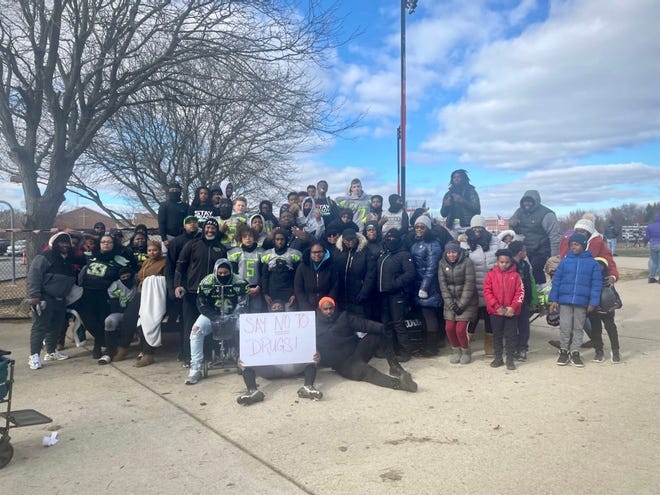The pressures that athletes face often lead to the use of addictive substances, and middle school and high school-aged athletes are no exception.
With the use of alcohol, drugs and nicotine products rising among young athletes, Delaware Ducks coach Joe Devane wants to equip his players with the knowledge needed to avoid substance misuse as early as possible.
“When you’re a student-athlete, you succumb to peer pressures at another level than a regular student because you’re expected to do great things,” Devane said “You feel pressure to do great things.”
Devane wanted to go beyond just coaching his players on the football field. He wanted to find an educational curriculum that could be catered to their needs.
He was awarded a state opioid response grant distributed by the Division of Substance Abuse and Mental Health Services, and the Ducks partnered with the organization to deliver its evidence-based curriculum to 30 of Devane’s 14U players.
“Kids that play sports tend to be the sort of kids that are go-getters and they have that drive which also, unfortunately, can sometimes mean that they’re more prone to alcohol use and marijuana use,” said Shelly Lazorchak, director of Prevention Services at the Department of Services for Children, Youth and Their Families’ Division of Prevention and Behavioral Health Services.
“There’s been a higher incidence of vaping among athletes, and certainly with prescribing painkillers for use after they’ve been injured,” she said.
The Ducks’ educational program specifically targets players age 13 and 14. An age when many make the transition to high school and are exposed to a host of new pressures and temptations.
Carmina Taylor joined the Ducks to partner with Devane in these efforts. She helped cater the Division of Substance Abuse and Mental Health Services’ curriculum to the team’s needs and broke the course material into lessons that can be taught over the course of the football season.
Devane and Taylor also included the parents of the players in the curriculum.
They achieved 100% parent involvement through Zoom meetings and training sessions.
“We were able to integrate parents in the implementation and execution of the curriculum,” Taylor said. “And the hope is, if we make this holistic approach to all these players, they will be equipped to fight back the pressures when they go into high school.”
Devane wants to extend his reach beyond just the Delaware Ducks program. He and Taylor partnered with the Division of Substance Abuse and Mental Health Services to plan a two-day conference to include teams across the state.
The conference will be held at Delaware State University on Aug. 13, where players will learn the importance of maintaining a balance between athletics and education, the dangers of opioids and other addictive substances, how to maintain a positive body image, and how to withstand peer pressure.

Devane extended invitations to a variety of boys’ and girls’ teams in Delaware, along with local Boys and Girls Clubs.
“I just have a special love for athletes, because I know what athletics do,” Devane said. “They’re long-reaching because they follow you through your academics, through your career, as an employee, or as a business owner. You know, these types of things that you learn as a young student-athlete are just priceless.”
Reach out to the Delaware Division of Prevention and Behavioral Health Services’ Prevention Helpline to learn about free prevention services around substance misuse, trauma, mental health, stress relief, healthy relationships, caregiver support, and more. Call 302-633-2680 or EmailPBHS_Prevention_Inquiries@delaware.gov
Contact Siera Jones at SLJones@delawareonline.com and follow on her Twitter @sieraajones. Support local journalism by subscribing to delawareonline.com.